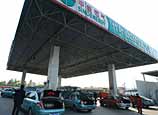
For years, China has had the image of being a low-cost workshop where quality is inferior and ideas are always copied - or stolen - from the West.
But while the Chinese government enhances its efforts to assist domestic companies on innovation and as their globalization process accelerates, companies like HIFU are gradually shifting the global preconception.
"Absolutely, HIFU has completely changed my mindset of made-in-China goods. Before HIFU, I thought Chinese brands were cheap and maybe not so good," Cranston said.
"I believe China could produce cheap medical machines yet with the same quality, or even higher quality, because Chinese people are extremely hard-working and good researchers," he said.
As global demand shrinks due to the financial crisis, growth of the world's second-largest economy's exports has been declining as well. In 2012, the nation's exports rose by 7.9 percent from a year earlier to $2.05 trillion, the lowest growth in a decade, compared with a 20.3 percent jump in 2011.
But that does nothing to detract from the country's progress on the world stage. An encouraging sign is that some Chinese companies, led by Huawei Technologies Co Ltd and Lenovo Group Ltd, have won international recognition for their know-how.
In 2009, China surpassed Germany as the largest exporter worldwide, and has maintained its position since then.
In 2011, China overtook the United States as the world's biggest goods producer by output, which helped the nation reclaim the global supremacy it lost in the 19th century.
Although China's exports to the EU dropped by 6.2 percent last year, the nation's share in the EU's market for foreign trade rose, experts said.
During the past two to three years, a rapidly growing number of Chinese companies have stepped up their efforts at acquiring Western rivals, those in Europe in particular, to obtain technology and networks, illustrated by Sany Group Co Ltd's purchase of Putzmeister in Germany.


















 Flight attendants recruitment attracts beautiful young applicants
Flight attendants recruitment attracts beautiful young applicants


![]()
